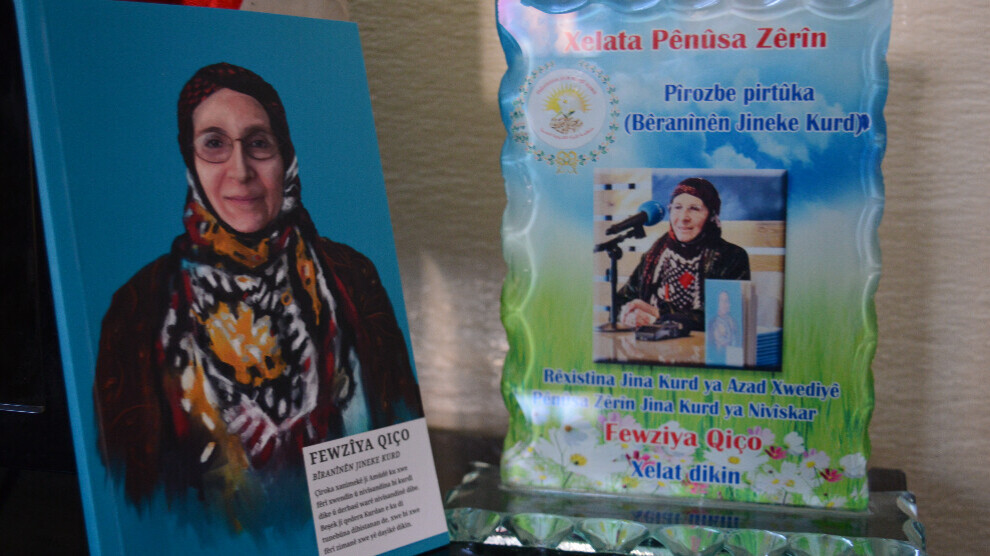She writes “Wounds of a Kurdish Woman” after 70
Fawziya Qiço, a mother in Rojava, learned how to read and write after the age of 70 and realized her dream by writing a Kurdish book entitled “Wounds of a Kurdish Woman.”

ROJ HOZAN
Qamishlo - We often hear the proverb saying, “You're never too old to learn”; however, this proverb cannot be used for people, who do not believe in themselves. Fawziya Qiço is a woman, mother who always follows her dreams and struggles for her dreams.
Born in the Amuda town of Qamishlo Canton, Fawziya Qiço could not go to school and had no opportunity to learn how to read and write. But she always dreamed of reading books. She learned how to read and write in Kurdish by herself. But she dreamed of not only reading books but also writing books; she wanted to write her own story. She realized her dream by writing a Kurdish book entitled, “Wounds of a Kurdish Woman.” NuJINHA spoke to her about her life story.
She followed her childhood dream
“I smile whenever I talk about my childhood because I had an active, playful and loving childhood. Sometimes, I say I have learned many things from my childhood. My mother had only daughters. We played with the children in our neighborhood. Sometimes, we used to tease our mother with our jokes, but I can say that those days were the best days of my life. Although I was a happy child, I wanted to go to school; however, girls were not allowed to go to school at that time. When I was a child, I dreamed of writing a book; however, I could not read and write,” she told us while talking about her childhood.
She learned how to write and read in Kurdish
Speaking about how she learned the Kurdish letters, Fewziya Qiço said, “Even after I got married and had children, my interest in science and reading and writing never ended. My spouse and children used to fall asleep while reading. When I looked at them, I wanted to read books, too. My late spouse used to say to me ‘let me teach you how to read’. He taught me Kurdish letters. I learned everything very fast. I wrote and read the letters for about two hours a day. While my spouse and children were reading books, I was studying the letters. One day, I wrote a sentence. When my spouse saw my sentence, he told me to study more because I learned very fast. I first read the books of Seydayê Tîrêj (a Kurdish poet and writer). Then, I started writing. I loved the stories in books and my spouse always encouraged me to read more books. I learned how to read and write when I was 50.”
She passed language exams
After the women’s revolution, Fewziya Qiçû attended language courses held by the Kurdish Language Institution. “My children became more successful at school when they saw how I studied. While doing the housework, I was studying. I have six sons so I did the housework. After the revolution, my son’s friend, who was a teacher, suggested that I should attend the language courses held by the Kurdish Language Institution. I attended language courses when I was 60. I was the only old person in the classroom. Young students called me Mother Fewziya Qiço. I passed all the exams and got my language certificate. My son Sirwan learned how to read and write in Kurdish from me. He is now a Kurdish teacher in the US.”
She witnessed the Amuda Cinema Massacre when she was 7
Stating that she wrote her memories in her book, Fewziya Qiço said, “In 2014, I moved from Rojava Kurdistan to the US. Before the revolution, I was a U.S. citizen. Since my son lives in the US, I often go there. I stayed in the US for several years to write my book. I wrote the draft of the book in the US and then returned to Rojava Kurdistan to write and publish my book because I could not stay away from my people. I wrote all my childhood memories in the book. The name of my book is ‘Wounds of a Kurdish Woman. I witnessed the Amuda Cinema Massacre when I was seven years old. I wrote about this massacre in my book. I am very happy to be able to write this book because writing a book was my childhood dream.”
‘You're never too old to learn’
At the end of her speech, Fewziya Qiço gave advice to the young people and talked about her future projects. “My advice to all women and young people is that they should always follow their dreams. You’re never too old to learn. Now, I work on writing a book named ‘child stories’. I want to write the stories our mothers told us when we were children to pass these stories down from generation to generation. I just started writing this book so it will take a long time to finish it. I also want to write a book about the revolution in Rojava Kurdistan.”
